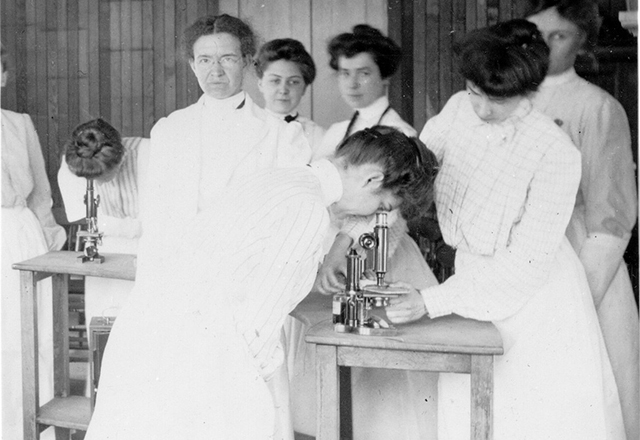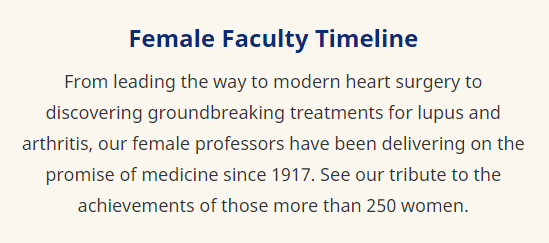In a time when women everywhere are fighting for equal pay, equal opportunities and an end to sexual harassment, it is important to celebrate women who have nevertheless persisted and succeeded in their chosen field. The school of medicine’s Office of Women in Science and Medicine (OWISM) aims to do this, and has given women at the school resources and support for years.
On June 19, the OWISM celebrated over 250 women and their promotion to full professor at the Johns Hopkins University School of Medicine. The event included multiple speakers, all of whom are full professors at Johns Hopkins, who shared their stories and their visions for the future. Many of the 254 female professors were present to support one another, and the event was a demonstration of how Johns Hopkins’ history of excellence has only been augmented by including and supporting female doctors, nurses and scientists.
This celebration was part of a larger event, the 125th year of the school of medicine. In recent years, the OWISM has worked to establish a committee on the status of women at the school, which focuses on their well-being, and compiling and interpreting data that relates to their promotion and professional development. In 1997, only 50 women had ever been promoted to full professor at the school of medicine; by 2018, this number has reached 254. Women are now being promoted to full professor at the same rate as their male colleagues at Johns Hopkins, which is the feat of a concerted effort from both men and women in leadership at the school.
As attendees walked into the room, a slideshow of the female professors played across the screen. Beginning with Florence Sabin, in 1917, hundreds of remarkable careers were covered. Dean Paul Rothman began the event by recognizing the achievements of these women, and highlighting the hardships many had to overcome. He explained that it took years of effort to create a learning environment in which women feel accepted and equal to their male peers, but also recognized that there is still much to be done. Citing the recent NAS report on sexual harassment in the scientific field, he stated that we cannot be satisfied and must strive to create a safe place for women to succeed, and encourage other centers of science to do so as well. Vice Dean of Faculty Janice Clements then took the stage to introduce the speakers, explaining how important mentorship and relationships with other women in science have been to her own success. She emphasized that each speaker has served as a mentor to countless others, and how this has made Johns Hopkins an even better environment for fostering the success of trainees and mentors alike.
Scientists Share Their Unique Perspectives on Success
The first speaker was Barbara DeLateur, who strode onto the stage wearing hiking boots and a backpack, with a walking stick in hand. She is the first woman to chair the Department of Physical Medicine and Rehabilitation and first became a professor in 1994. She began by explaining how her father sought to provide each of his children with an education, and how “he was a feminist before there was such a word.” She went on to study medicine at the University of Washington, where she found an excellent mentor who supported her — and pushed her a bit, too. Her career has since been fueled by her desire to provide service to her patients and model problems for students, with many in the room having directly benefited from her mentorship. She credited her own mentors, including her father, for always pushing her to strive for more, and asserted that it is always important to follow your passions, despite obstacles. DeLateur ended her talk by finally commenting on her ensemble, explaining that she soon leaves for El Camino in Spain, and that this, too, is a metaphor for medicine — there are challenges and setbacks, but you continue and hopefully have some accomplishments and triumphs along the way.
These journeys are often complex and tangled, but out of this can emerge a beautiful life. Lisa Cooper, internist and epidemiologist, continued the talks by sharing her journey in the medical field, comparing her career to weaving a tapestry. Her four main lessons were that respect, relationships, resources and revision can be instrumental in anyone’s career. As the first woman of color to be promoted to full professor, in 2007, she has used her personal experiences to fuel her passion of studying health disparities. While her career has had its share of obstacles, Cooper has made great strides in the field of social epidemiology — uncovering racial and income health disparities and finding new ways to address them. She explained that each of our tapestries may seem a bit messy, but from another perspective they are a beautiful monument to our efforts in life. Cooper emphasized that respect for others and cultivating relationships can help us learn, and grow, but that we must always be willing to revise and reflect on our lives.
Reflecting on our own lives can help us discover our paths for the future, and remembering those before us can help light the way. The next speaker highlighted the efforts of the 249 women before her. Lisa Ishii was the 250th woman to be promoted to full professor. Dr. Ishii is a professor of otolaryngology, and an expert in head and neck surgery. She reflected on the past achievements of women in her field, expressing gratitude to those women who have fought to give today’s women the chance for equal opportunity. She emphasized that we should make goals in life, and stay accountable to them, so that we continue to grow in our careers. Ishii also explained that it is incredibly important for women to support women, and to create a welcoming environment for all female scientists and medical professionals.
Throughout the talks, the ideals of grace, gratitude, respect and an everlasting desire to learn were shared by many of the women. The keynote speaker was the embodiment of many of these ideals — a woman who served as a mentor to many of the professors present and who sought to support women and build them up throughout her career. Martha Hill began her nursing career at Johns Hopkins in 1961, where she discovered what she deemed the “magic” of Hopkins. This magic is the mission of research, care and service that she feels the school embodies. Through her education, she had an excellent mentor who encouraged her to educate other medical professionals about high blood pressure, an area in which she had expertise. From there, she became more involved with the American Heart Association, of which she later became president. Yet through her leadership, she always remained prepared to help bring others forward.
She shared a story of a negotiation to allow nurses to apply for grants through the heart association, showing that every effort in which someone stands up to support women is significant and can lead to change. One of her lessons is that you must always be prepared for a situation, so that you can take advantage of each opportunity fully. To be prepared, you should understand the mission of your organization and truly live it. Through her time as the dean of the school of nursing, she brought the school to the No. 1 position in the country, and served as a mentor to countless students along the way. She ended by confessing her hope that someday we won’t be counting how many women professors there are, because they will simply be the norm.
All these women exemplify the excellence of Johns Hopkins, and only enhance the school of medicine’s reputation as a world leader. Many of these women have faced obstacles along the way, but their commitment to medicine and science led them through. This celebration was an amazing showcase of the many talented professors at the Johns Hopkins University School of Medicine, and it was an excellent reminder of the great contributions female scientists, nurses and doctors have made throughout the school’s history.

